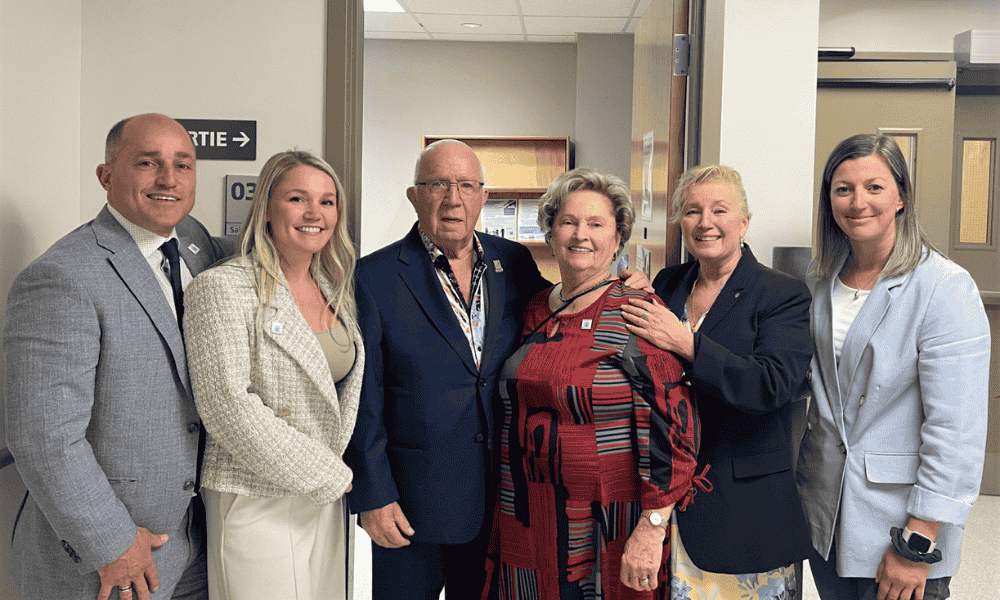News
A volunteer for several years with the CHUS Foundation, driven by a desire to give back, Guylaine Bergeron recently chose to share part of a financial inheritance she received to support the psychiatry unit.
.jpg)
Mental health is a cause that’s deeply personal to her. By sharing her story publicly today, she hopes to break taboos and inspire others to give back to their community.
Guylaine Bergeron is a former athlete who taught physical education at the high school level for over 30 years. Exposed early on to the realities of mental health due to her father’s struggles, she herself went through a dark period that led to hospitalization in psychiatry.
“In 2012, I was hospitalized for three months at CHUS. To this day, it’s still the fight of my life,” says the Sherbrooke native. “At first, I was ashamed to talk about it. It’s such a taboo subject, and there’s also a lot of ignorance around mental illness. But it can happen to anyone—it’s not about education level or social status. A friend once told me that I wouldn’t get better by lying in bed all day. Comments like that are hurtful and can make things even worse.”
Already involved in various volunteer projects related to sports, Guylaine wanted to use her experience to help others living with mental illness by volunteering with the CHUS Foundation. She recently received the “Rookie of the Year” award at the Foundation’s Recognition Gala. In recent months, she decided to deepen her commitment by taking concrete action for the mental health cause.
“I love helping people and being useful in a way that makes a difference in society. Ever since my hospitalization, I’ve wondered what tangible contribution I could make,” explains Guylaine. “After my mother passed away, I received an inheritance and chose to donate part of it to the psychiatry unit through the CHUS Foundation. I also decided to make a planned gift to support this cause that’s engraved on my heart.”
Concrete Actions to Improve Patients’ Daily Lives
Guylaine’s generous donation has already made it possible to replace outdated rocking chairs with new ones. Other projects will also be able to move forward thanks to her support. “Right now, I’m reviewing different proposals from the team,” explains Mario Parenteau, head of the psychotic and affective disorders units at the CIUSSS de l’Estrie - CHUS. “We already have a few ideas, like creating a multisensory room,” he adds, noting that mental health needs remain significant—and continue to grow.
According to him, the psychiatry patient population increases by about 5% each year. In fact, data from the Institut national de santé publique du Québec show that the rate of emergency room visits due to suicide attempts rose from 45.5 in 2020 to 59.2 per 100,000 people in 2024. Despite the rise in hospitalizations and emergency visits linked to mental illness, Mario Parenteau points out that treatment approaches have evolved greatly since the 1990s, when he first began working at CHUS. It’s a change he views positively.
“At the time, the message of suffering wasn’t fully understood by staff,” he recalls. “Today, the approach is much more centered on human connection than on control. Also, siloed work is disappearing. I feel very fortunate to work with passionate people who are here for the right reasons. It takes a lot of empathy to work in this unit, because patients are often in a place where they can’t see the light at the end of the tunnel. But mental health remains a highly taboo subject. The word ‘crazy’ is still thrown around a lot. There’s still a long way to go to dismantle those prejudices.”

Subscribe to our Newsletter!
Pour rien manquer de l’actualité de la Fondation du CHUS.

.jpg)
.jpg)
.png)
.png)
vf.jpg)
.png)
.png)
.png)
%20(1).png)

.png)
.png)
.jpg)
.jpg)
.jpg)

.jpg)
.jpg)
.jpg)
.jpg)
.jpg)
.jpg)
.jpg)
.jpg)
.jpg)

%20site%20web.jpg)





.png)

